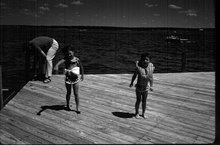
H.C.Pipkin, Burning Bush 1947
You are the salt of the earth. But if the salt loses its saltiness, how can it be made salty again? It is no longer good for anything, except to be thrown out and trampled by men.
-- Matthew 5:13
Is it right to raise one’s voice when other’s are being silenced? Yes…Another way of formulating the question is, Is it better to shout and thereby hasten the end, or to keep silent and thereby gain a slower death…And again the thought we already know: Human life occurs only once, and the reason we cannot determine which of our decisions is good and which is bad is that in a given situation, we can make only one decision…
--Milan Kundera, The Unbearable Lightness of Being
I viewed my grandfather from a remote corner of my soul. I don’t know at what point I recognized myself in him, but he never, as far as I know, recognized himself in me. I was the dark, saturnine child in a family of golden children, and perhaps my brother and sister served up the hope of our being a golden family. But I was evidence of the strange currents that coursed through our veins, always watching, missing nothing, remembering everything.
One of the facts about my grandfather that had always intrigued me was that at one point in his life he almost became a man of God, a preacher in the Baptist Church. This strikes me for several reasons, not least among which was that he never once, in my lifetime, attended church. My grandmother said that as a young man he preached powerfully on the Sermon on the Mount. But there was another young man within the church who also had his sights set on becoming The Man of God in the Baptist church, and the rivalry between them grew so bitter that my grandfather walked away one day and never again set foot in that edifice where he had experienced those deep yearnings.
Where did that all go? How can a man be consumed with passion for what is holy and then turn his back on that forever over an earthly quarrel? I know when I turned my back and why. It is a “humorous” family story that my mother used to tell to amuse her friends. By the time I was ten, we had become Episcopalians. I had decided that I wanted to give my life to the church, to the sick and the suffering and the poor. For Christmas, the only thing in the world I wanted was a communion set so I could begin administering to my flock as soon as possible. My mother said nothing, but she arranged an appointment with our priest. I don’t remember much of what was said in that meeting, but I remember the bitter heartbreak. It had been made clear to me during that meeting that God neither wanted nor needed me. I am still trying to forgive Him for it. But I patiently hold that fervent sense of Presence, of almost touching, and apprehend it all around, in cottonwood seed drifting down, in a dragonfly alighting on the water, in the reflections of light in the leaves of trees. I do this as if the world depends on it.
Salt prints were the earliest positive prints and were invented by William Henry Fox Talbot in 1840, as a direct development from his earlier photogenic drawing process. A salt print was made by soaking a sheet of paper in salt solution and then coating one side with silver nitrate. This produced light sensitive silver chloride in the paper. After drying, the paper was put directly beneath a negative, under a sheet of glass, and exposed to sunlight for up to two hours. Salt prints were made until about 1860 having been gradually replaced by the albumen print which gave a clearer image although the process was sometimes revised later.

















